Debunking The Myths of Calcium and Milk

Debunking The Myths of Calcium and Milk
Oct 31, 2023 | By JOI team
Long gone are the days when parents automatically serve their growing children a glass of cow's milk for strong bones… But for years, drinking milk from cows was seen as fuel for growth and development. And that’s mainly because it contains calcium.
But, guess where cows get their calcium from? Surprise, surprise...from plants. Calcium is found in a variety of plant foods, from leafy greens to nuts.
Plus, relying on dairy for dietary calcium comes with baggage. We’re talking increased risk for chronic diseases, exposure to hormones and antibiotics, lactose intolerance, increased inflammation and high saturated fat intake (which may increase cholesterol levels). What is the truth about calcium and milk?

Photo by Tamara Chemij from Burst
CALCIUM’S ROLE IN THE BODY
Calcium is the most abundant mineral in the body. It is essential for bone health and teeth health. In fact, 99% of calcium in the body is stored in the bones and teeth, where it helps form and maintain bone structure and hardness.
Besides keeping us on our feet (literally), calcium is required for transmission of signals in the nervous system. In short, this means that it helps your brain chat with the rest of your body.
It also plays a role in hormone secretion, muscle function (including your heart), blood clotting. In addition, calcium aids in regulating the "constriction" and "dilation" of blood vessels. Regulating such opening and closing of blood vessels keeps your blood pressure in check.
HOW MUCH CALCIUM DO I NEED?
Because the body does not make calcium, we need to get it from food. The daily recommendation is 1,000 mg for adults up to 50 years of age, and 1,200 mg for women older than 50 years old (since they experience more bone loss).
P.S. Calcium and vitamin D are BFFs. The body requires vitamin D to absorb calcium, so they are always together. This means that even if you’re consuming enough calcium, it may all go to waste if you don’t have enough vitamin D to help absorb it. So, make sure you get that pretty face of yours in the sunshine every so often.
Another way to promote strong and healthy bones is weight-bearing exercise. Whether it’s lifting weights, practicing your dance moves, hiking a mountain, playing a game of tennis, or simply going for a jog, exercise is important to keep your bones strong!

Photo by Sarah Pflug from Burst
WHAT IF I DON’T GET ENOUGH?
Insufficient intake of calcium lowers blood levels, causing your body to leach calcium from the bones.
Although in the short-time there aren’t any major complications, over time, calcium deficiency can lead to hypocalcemia, loss of bone mass, osteopenia, or osteoporosis (weak, fragile bones). All of these increase the risk for bone fractures.
Calcium deficiency may be caused by poor calcium intake over a long period of time, hormonal changes, or medications that decrease calcium absorption. Symptoms include muscle cramps, confusion, weak and brittle nails, numbness or tingling in hands and feet.
SHOULD I SUPPLEMENT?
Healthy individuals should be able to obtain adequate amounts of calcium through foods, so supplementation is usually not necessary unless recommended by a physician.
Studies show that people following a fully plant-based diet who consume adequate amounts of calcium through their diet are at no greater risk for developing bone fractures (such as a hip fracture) than those following a standard diet.
Supplementation may be beneficial for older women who are at a higher risk for calcium deficiency in order to prevent bone loss and are not meeting calcium needs through food.
OK, SO WHERE ELSE DO I GET CALCIUM?
- Almonds, Brazil nuts
- Beans (white, navy, black)
- Cruciferous veggies (broccoli, brussels sprouts, cauliflower, okra)
- Root veggies (butternut squash, sweet potato)
- Chia seeds, flax seeds
- Dried figs
- Leafy greens (bok choy, kale, collards, turnips, mustard greens)
- Molasses
- Okra
- Oranges
- Soybeans (edamame, tofu)
- Sunflower seeds, sesame seeds
- Tahini (sesame seed paste)
Plus, many foods are fortified with calcium. These include cereals, orange juice, and alternative milks and soy products.

Photo by Sarah Pflug from Burst
WHY ARE ALL JOI PRODUCTS NOT FORTIFIED WITH CALCIUM?
“JOI” stands for “Just One Ingredient.” Some of our milk concentrates made with just that: one ingredient.
With that said, we also develop products that are made from simple, purposeful ingredients. That's why we've included calcium in the short list of ingredients (along with organic oats, avocado and MCT oils, plant fibers & cane sugar) in our oat milk creamers.
The bottom line: if you’re mindful about implementing calcium-rich sources into your diet, you should be able to meet daily needs. But again, individuals with absorption issues or nutrient deficiencies may benefit from supplementation and fortified foods.
CALCIUM AND DAIRY MYTHS, DEBUNKED
Myth 1: The only good sources of calcium are dairy products
There are many plant-based sources of calcium. These foods are especially important in the diets of those who are lactose intolerant, have a milk allergy, or want to follow a plant-based lifestyle. In fact, when consumed in adequate amounts, plant foods can provide the same or even more calcium than a glass of milk. Take tofu, for example: ½ cup of tofu offers 430 mg of calcium, while one cup of cow’s milk offers 300 mg.
Myth 2: Cow’s milk gives strong bones
Contrary to popular belief, studies have found that there is no strong association between calcium from dairy sources and bone strength. In fact, one study conducted over 12 years with more than 70,000 women found that there was no significant difference in the numbers of bone fractures between individuals who drank one glass of milk a week or less, and those who drank two or more. In another large study, higher milk consumption during teenage years was associated with higher incidence of fractures in women, and higher mortality in both men and women in adult life.
Myth 3: You cannot get too much calcium
When talking about calcium, there can be “too much of a good thing.” High calcium intake (above the upper limits) usually happens from calcium supplementation, not from food. Too much calcium from supplements may increase the risk of kidney stones in adults, interfere with absorption of iron and zinc, cause constipation and muscle pain. Some research suggests that additional calcium may accumulate in the arteries and contribute to plaque formation (which increases the risk for heart attacks).
DAIRY COMES WITH BAGGAGE…
It’s no surprise that consumers are shifting toward dairy-free alternatives (hello, JOI milk). For one, more than 65 percent of the population is lactose intolerant. Also, research studies have linked regular consumption of dairy products to increased risk for breast cancer, and prostate cancer (another study on dairy and prostate cancer here).
Plus, a study conducted among lactose intolerant individuals (little to no dairy consumption) found that they had significant lower risks for lung, breast, and ovarian cancers. This is in contrast with persons who consume dairy regularly, who did not experience the same risk reductions.
P.S. If you are trying to limit dairy consumption (whether it is for health, intolerance or other reasons) and suspect you are not meeting the adequate calcium intake through foods, it’s important to consult with a Registered Dietitian or with a physician before changing your diet or taking any supplements.
Now that we have spilled the tea on all things calcium, it’s time for an almond milk latte.
By Carolina Schneider, MS, RD (@CarolinaTheGreenRD) is a registered dietitian and writer specializing in plant-based nutrition. She is the founder of Hungry for Plants, a company dedicated to offering nutrition consulting services to health and wellness brands, primarily in the plant-based food and beverage space. Carolina believes in eating better, not less. Her favorite JOI recipe is the Cashew Coconut Curry.





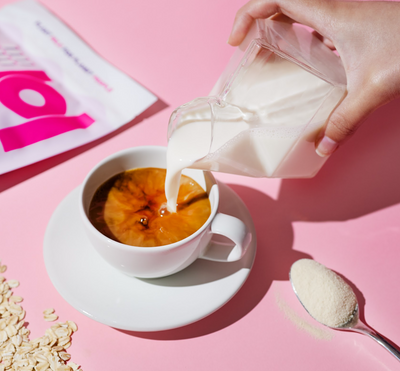
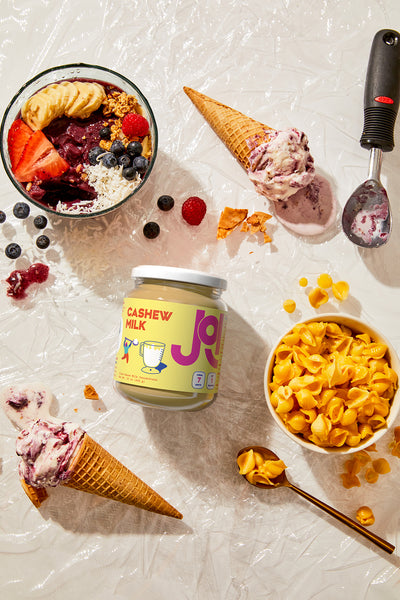
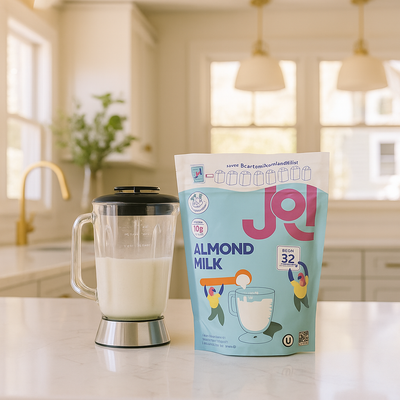
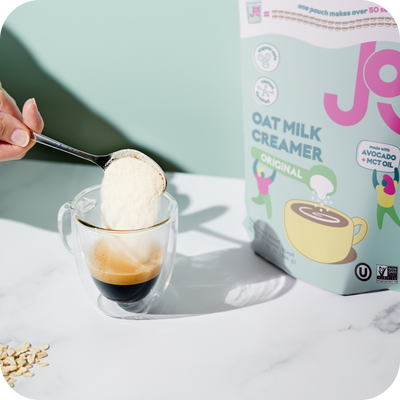
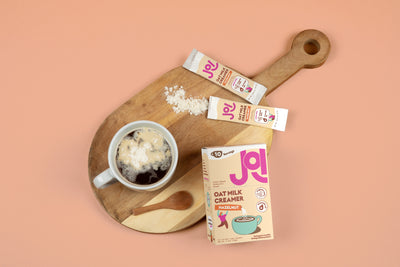
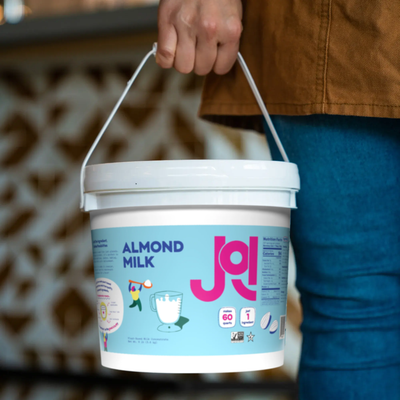
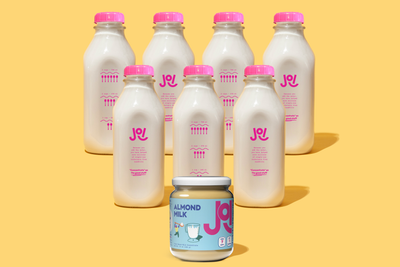
 CHECKOUT
CHECKOUT